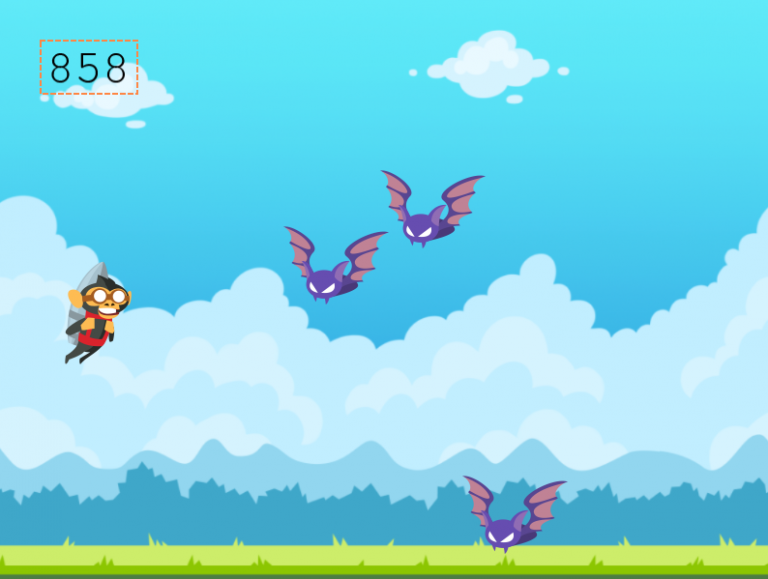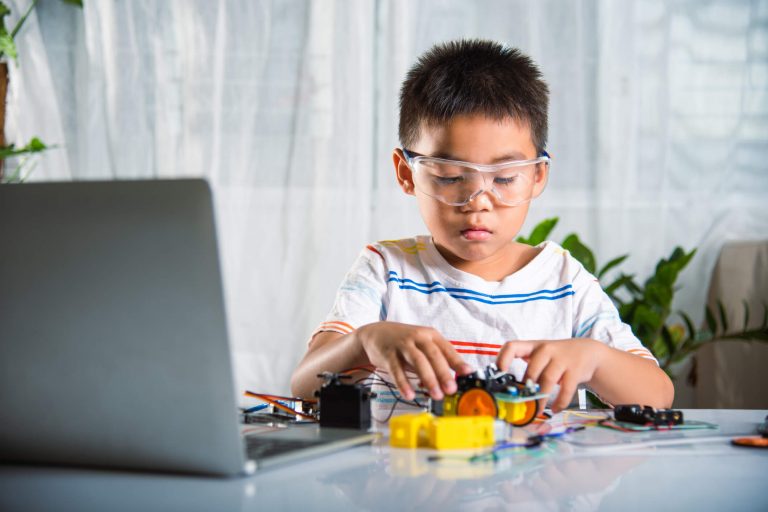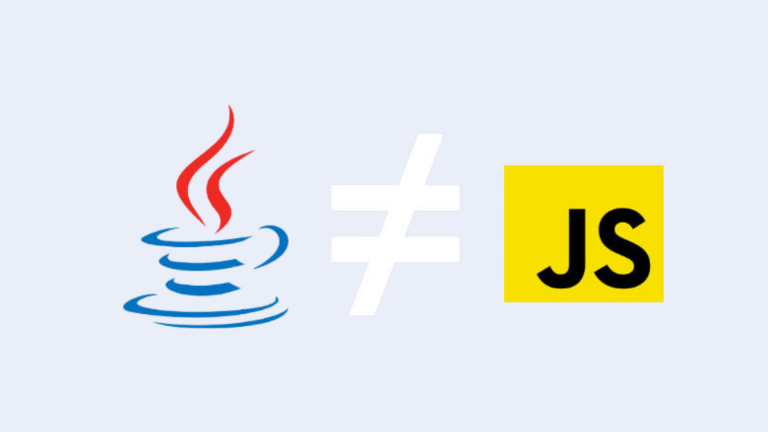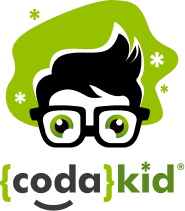Do you know two of the most common challenges parents and instructors face when it comes to creating the best science homeschool curriculum for STEM?
One is getting kids interested. Two is keeping them engaged.
This is difficult enough in a classroom setting, but what about home? There are so many online platforms and resources to choose from that parents and instructors can get overwhelmed trying to find the best one.
Our solution? Find and curate the best online platforms and resources that follow STEM standards and certified teaching approaches. There is certainly a lot, but we managed to trim the list down (significantly) using the following criteria:
- Simple. The curriculum is very simple to use and does NOT require parents (or instructors) to have a very strong technical background in order to teach STEM
- Meaningful. The curriculum should NOT heavily rely on unnecessary tests and/or projects that do not align with the student’s interest
- Engaging. The curriculum encourages the student to explore his or her surroundings (on and offline) and use resources beyond what was already given to him or her
- Challenging. The curriculum gives students assignments and topics that encourage them to think outside of the box in order to solve problems and appreciate STEM for what it is
This way, no matter what your background or circumstance, you can teach your child science, technology, engineering, and mathematics. We managed to narrow the list down to 17 incredible platforms:
- CodaKid
- littleBits
- Science4Us
- TeachEngineering
- Scratch 3.0
- TimberDoodle
- e-science
- UZinggo
- JASON Learning
- Experience Astronomy
- Code.org
- Apologia Online Academy
- AoPS Online Programs
- EEME
- Piper Computer Kits
- Tynker
- Fascinating Education
Without further ado, let’s take a closer look at the 17 best science homeschool curriculum options for STEM.
Table of Contents
CodaKid
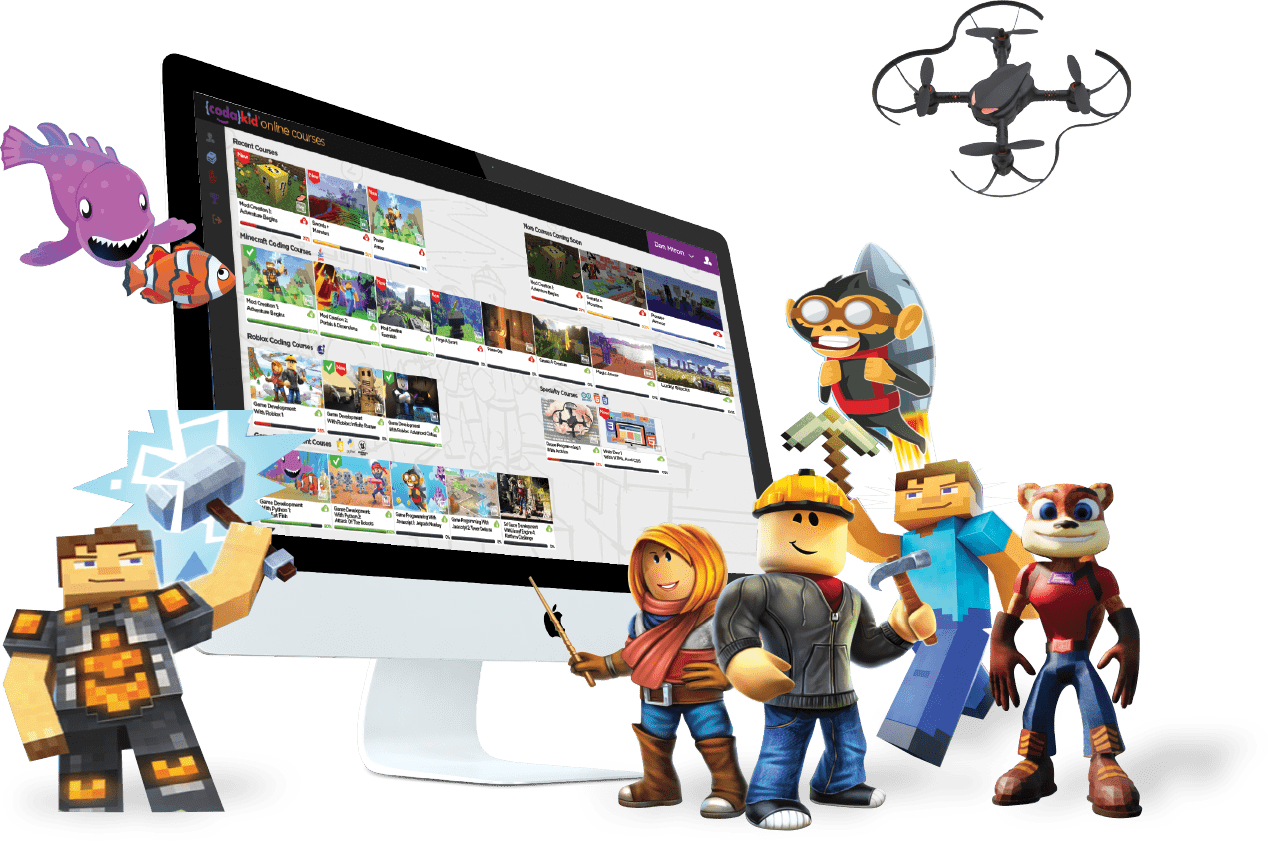
Winner of the 2017 Parents Choice Gold Award, the Tillywig Parents Favorite Product Award, and rated as the Best Camp, Classes, and Activities for Kids on ActivityHero for 2016 and 2017, CodaKid is an online academy that teaches coding for kids using fun, entertaining, and highly interactive mediums. Kids learn how to create games, apps, and Minecraft mods using actual programming languages and professional tools.
Their courses include:
- Scratch 3.0
- Python
- Java
- JavaScript
- Unreal Engine Blueprints
- Lua
- HTML/CSS
- Arduino
- C# (coming soon)
What makes CodaKid truly stand out is CodaKid’s self-paced, “online anytime” approach to learning. Kids can take the lessons at their own pace, picking it up whenever they choose to. And whenever they do so, they’ll always have full access to CodaKid’s live support in the form of professional software engineers and coders.
Your kids might be especially interested in these courses:
- 14 Minecraft Coding Courses (Using Minecraft servers for things like Mod Creation: Epic Weapons, and more)
- 9 Roblox Coding Courses (Roblox Game Development: Racing Maps, Roblox Game Development: Battle Royale, and lots more)
- 9 Game Programming Courses (Game Programming With Python, Game Programming With JavaScript, and lots more)
- 13 Scratch Coding Courses (Scratch Infinite Jumper, Scratch Art & Sound, and lots more)
- 2 Specialty Courses (Web Development with HTML & CSS and Drone Programming with Arduino)
Since 2016, CodaKid has taught nearly 10,000 students in 15 countries and has also since been featured on Fox News, Inc. CBS News, and other reputable networks. If your kid wants to learn what it means to be an actual programmer using real-life programming tools, CodaKid is your best choice.
For a limited time, start your free trial today!
littleBits
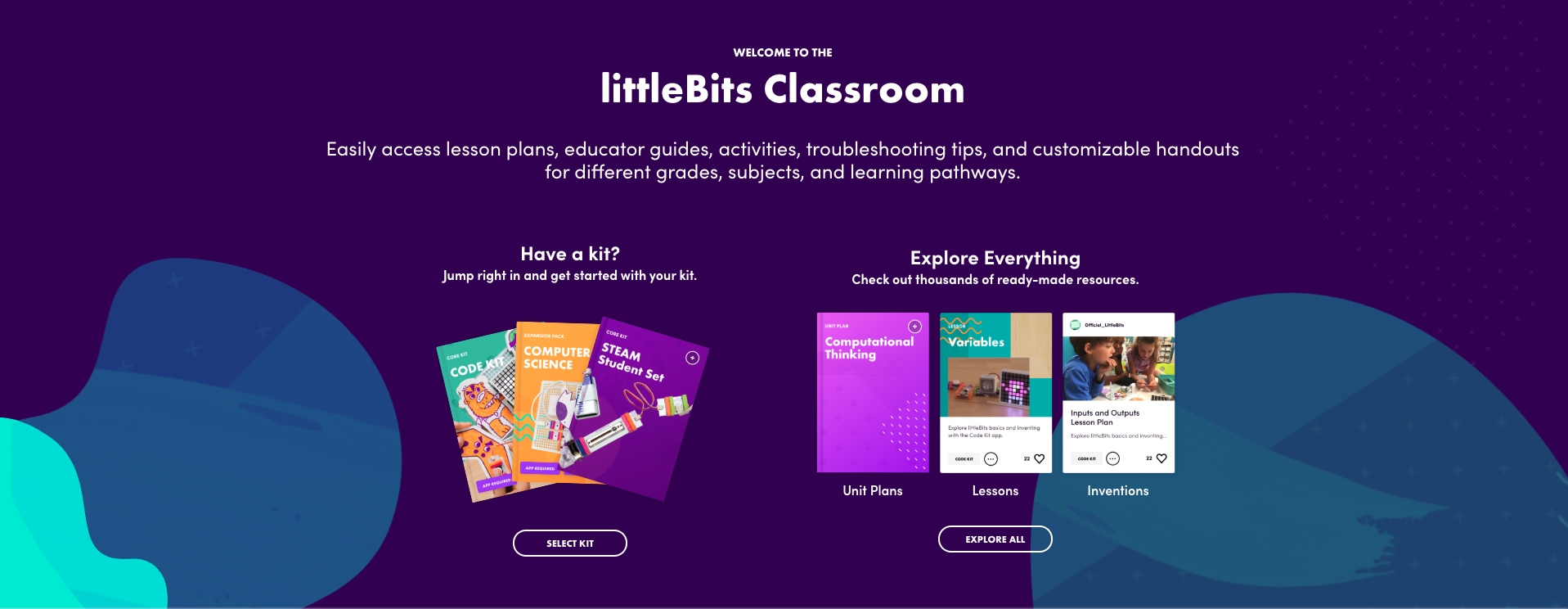
littleBits is a New York-based education startup that entered the scene in 2011. They believe that technology can empower kids to do great things, and they seek to do exactly that. The “Bits” that they’ve created are electronic building blocks that snap together to “turn ideas into inventions.” These magnetic pieces have transformed the way kids learn, equipping them with the unlimited creativity, logic, and foresight they need to be leaders and changemakers.
littleBits believes that any kid can change the future regardless of their race, gender, nationality, age, or ability.
With more than 1 million inventions and roughly 20,000 school partnerships, littleBits is a trustworthy brand that can help your kid learn the fundamentals of so many subjects. What’s more, their classroom page is full of educator guides, lesson plans, customizable handouts, and activities for all sorts of grades, subjects, and learning pathways.
With a variety of play kits designed with STEM and STEAM curriculum in mind—including their ever-popular littleBits Code Kit, STEAM student set, and Avenger’s Hero Inventor Kit—your child is sure to find something to love and learn from.
Science4Us
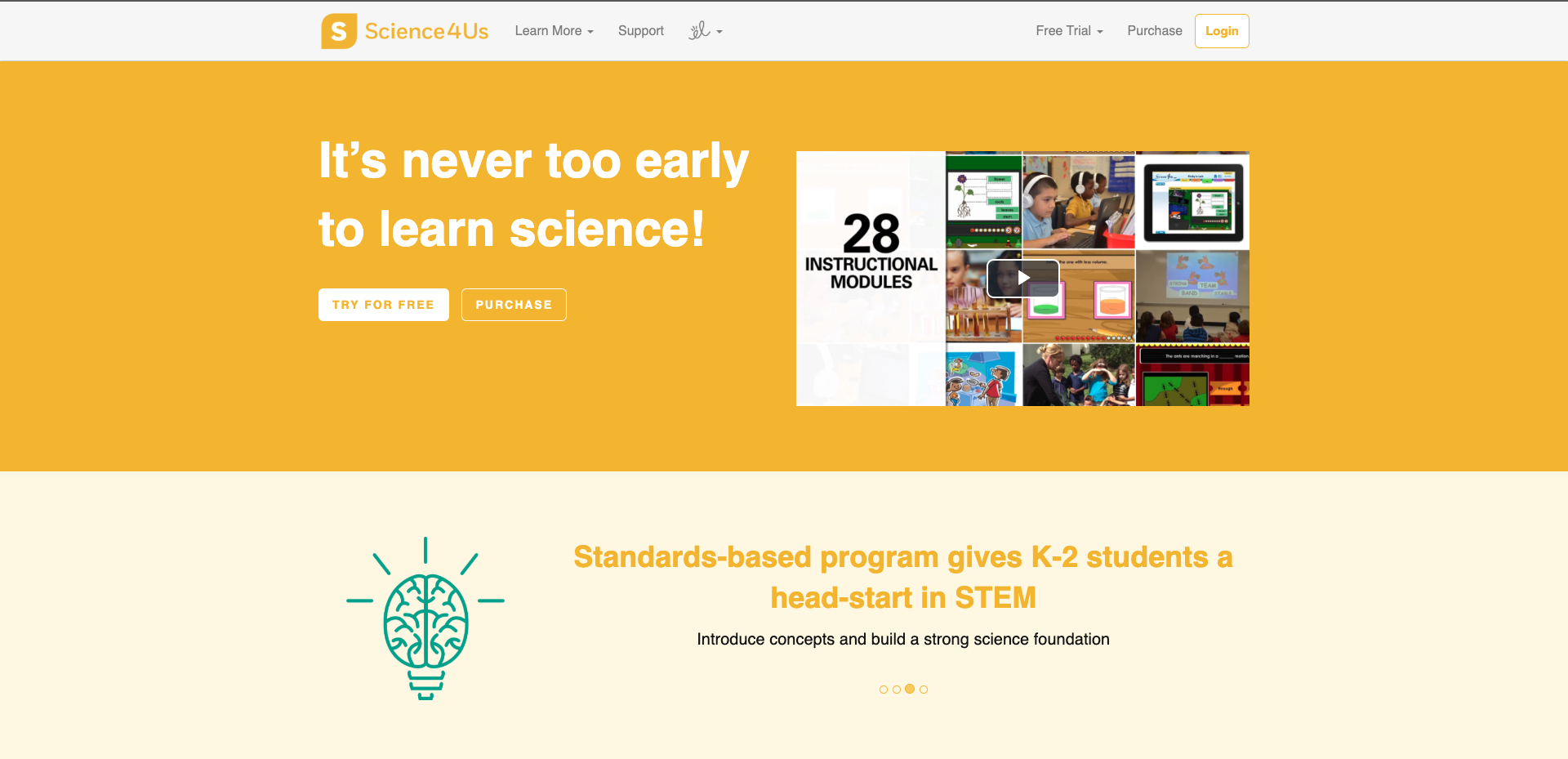
“It’s never too early to learn science!” Or so says the incredibly cheerful front page of the Science4Us website.
Created by ExploreLearning®, Science4Us is an award-winning, introductory, online STEM course that teaches elementary school students how science connects with non-STEM subjects—like—art and physical education. This 28-module course gives kids a hands-on learning experience using the 5E model, allowing for flexible delivery methods and own-pace learning.
Their lesson plans are easy to implement and incorporate other non-Science skills as well, like reading and literacy. One lesson even lets children learn about earth science by composing a limerick!
Right now, the Science4Usoffers four major subjects in their curriculum:
- Physical Science—Subtopics: Matter, Energy, Force & Motion
- Inquiry Science—Subtopics: Science Skills
- Life Science—Subtopics: Living Things, Balance in Nature
- Earth/Space Science—Subtopics: Earth, Space
Science4US is a Cool Tool Award, 2014 Finalist, by EdTech Digest, a Distinguished Achievement Award 2014 Finalist by Revere Awards, and a Siia CODiE Award Winner in 2016. For parents looking to give their children a liberal arts-style science homeschool curriculum, this is definitely worth checking out.
TeachEngineering

TeachEngineering.com is a free, online platform/digital library that offers hundreds of NGSS-aligned (Next Generation Science Standards) STEM lessons and engineering curricula suitable for elementary, middle, and high school students.
Educators and homeschooling parents have free access to their growing resources of activities, lessons, maker challenges, and other supplementary materials that are specifically designed to help children learn about STEM subjects and Computer Science in and outside of the classroom.
These resources were developed nationwide by university engineering faculty, graduate students, and K-12 teachers. Submitted from over 70 different institutions, the contents of TeachEngineering’s library are all certified approved and classroom-tested.
With roughly 89 curricular units spread out over three levels—elementary, middle school, and high school—TeachEngineering is a free digital resource that’s suitable for most styles of teaching and learning. Though not a specific science homeschool curriculum, it’s a great platform to jumpstart your child’s STEM journey.
Scratch 3.0
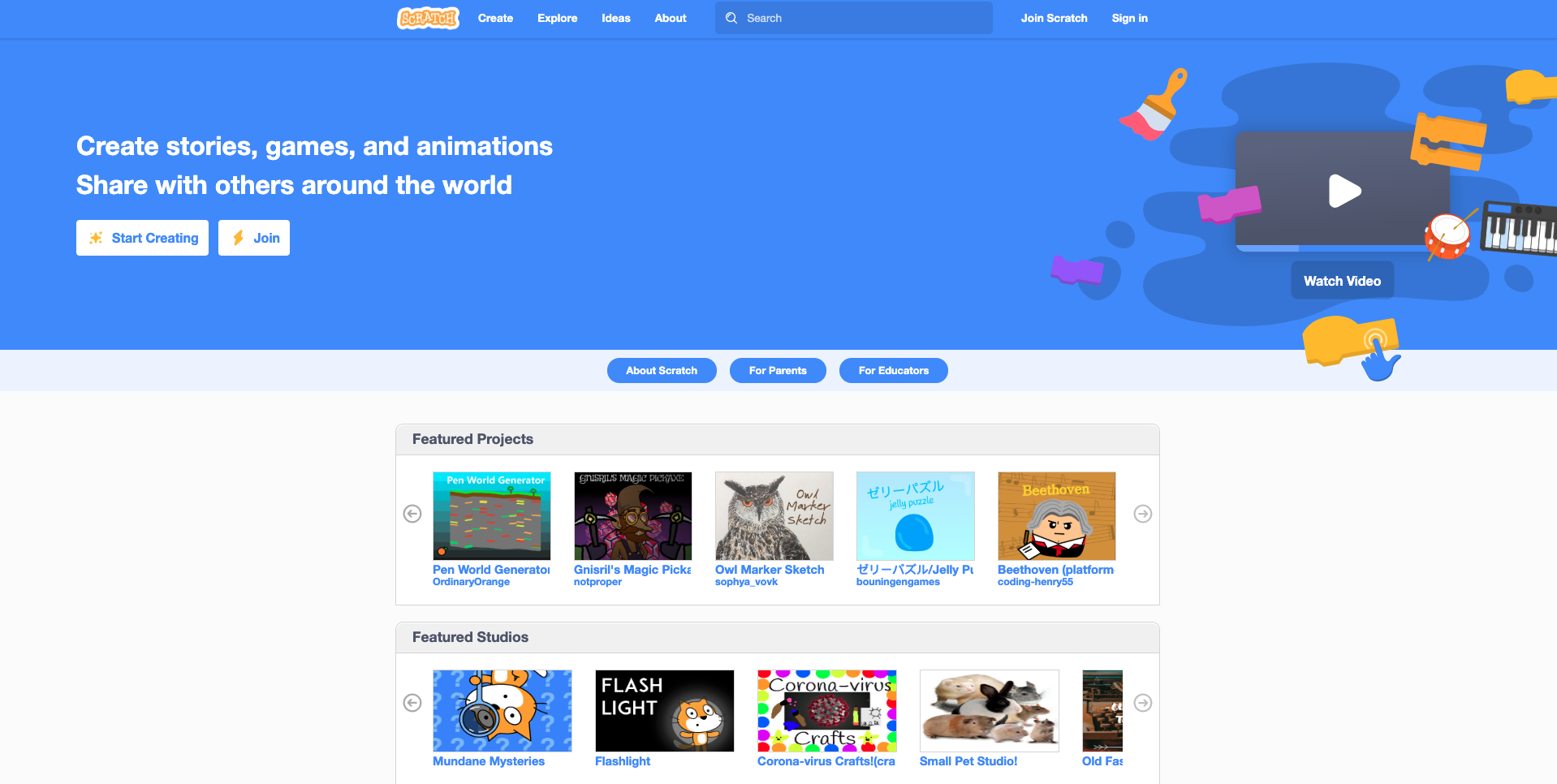
Released in early 2019, Scratch 3.0 is the latest rendition of the original Scratch visual block coding for kids platform.
Developed by Mitch Resnick and his team at MIT, Scratch provides kids as young as age 6 with a free creativity suite that allows them to build their own games, puzzles, animations, and more using their intuitive platform. Intuitive and highly responsive, Scratch 3.0 is designed specifically for ages 8 to 16, but beloved by students well beyond that age range.
The group believes that the ability to code computer programs is a valuable skill that everyone—especially in this day and age—should possess. Now a major project of the Lifelong Kindergarten Group at the MIT Media Lab, Scratch has become an essential tool for many students across all levels and across all disciplines.
To this day, Scratch is considered a viable science homeschool curriculum. It is used in more than 150 different countries and is available in more than 40 languages.
It’s fairly straightforward to get started on Scratch, but if you prefer a more curated pathway, you can find some excellent books and online guides for the subject.
CodaKid’s award-winning Scratch program has 14 courses, 40 quests, and 90 challenges with mentors who are professional programmers that guide you every step of the way! Try it for free!
TimberDoodle
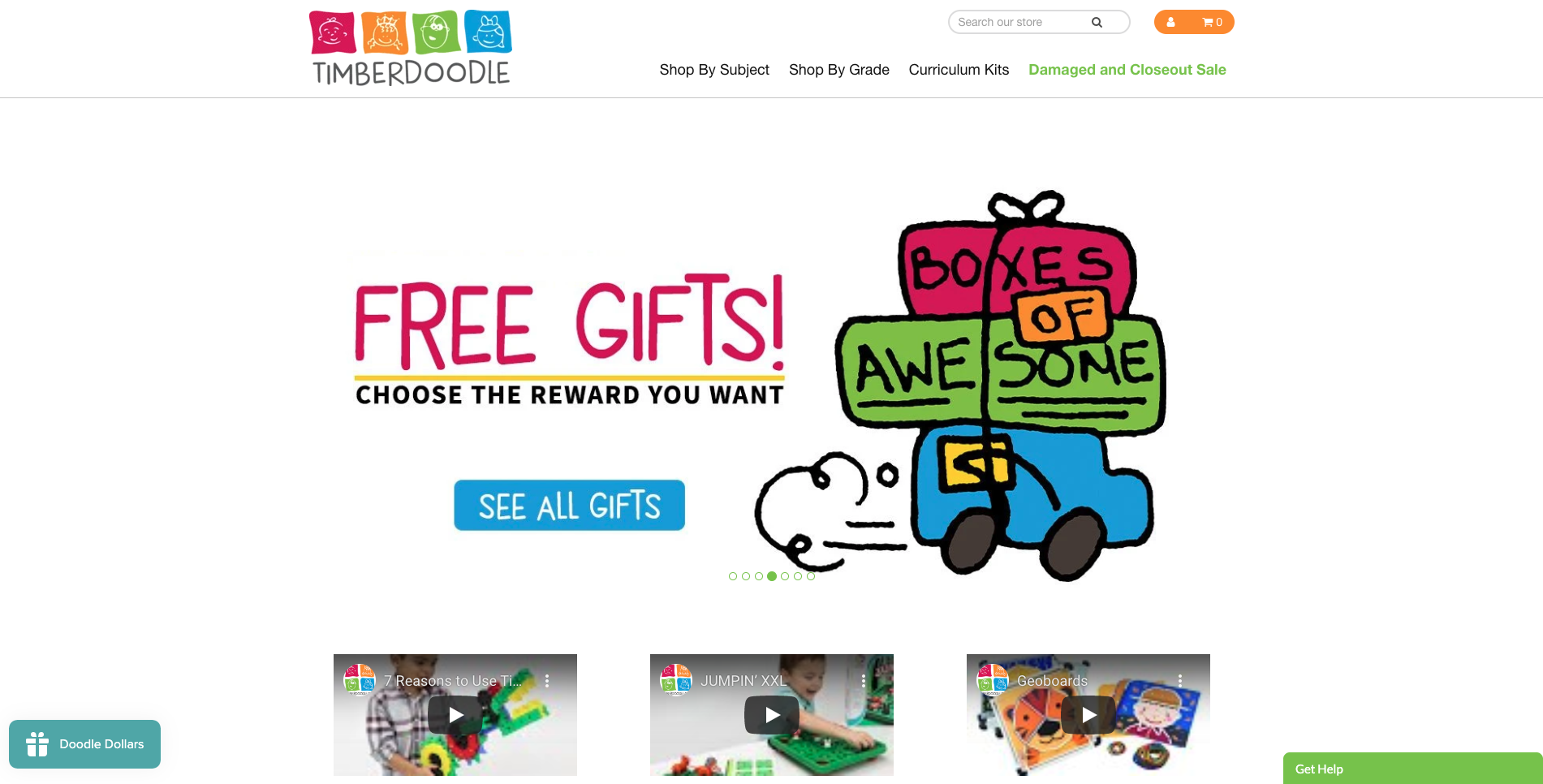
A two-time winner of the Practical Homeschooling Reader Award, the Timberdoodle STEM Curriculum Kits are designed to help children understand how STEM subjects interconnect with one another.
Depending on which option(s) parents choose, each kit comes with a multitude of toys that kids can use to learn about STEM—both online and off. You can purchase a kit of SCRATCH coding cards, a step-by-step robotics kit, a block builder/puzzle set, and more.
Each kit comes with a homeschool computer curriculum guidebook that explains how to use the toys (and books) inside the kit. There’s also a handy checklist to help parents keep track of their child’s progress.
If you have a basic understanding of STEM subjects and want to further expose your children to the world of STEM through a fun science homeschool curriculum offline, Timberdoodle kits are an ideal choice.
e-science

Created by former NASA scientist and university professor Aurora Lipper, e-science is a complete online science homeschool curriculum that utilizes a combination of video, reading, live video teleclasses, exercises, projects, and quizzes to bring an interactive, hands-on experience to K-8 students. Lipper designed it to be as kid-friendly as possible without downplaying important information or glossing over any challenging elements.
It’s perfect for parents who don’t have a professional grasp of science concepts or don’t have the time to walk their children through a comprehensive curriculum. What’s more, Lipper’s casual, easygoing attitude makes a lot of the lessons less intimidating and more interesting.
In addition to biology, chemistry, and physics, E-Science also offers courses in marine biology and geology. With over 800+ science activities and experiments, plus an expanded version for grades 9 to 12, e-science is an incredibly extensive program that many parents may find highly beneficial.
UZinggo
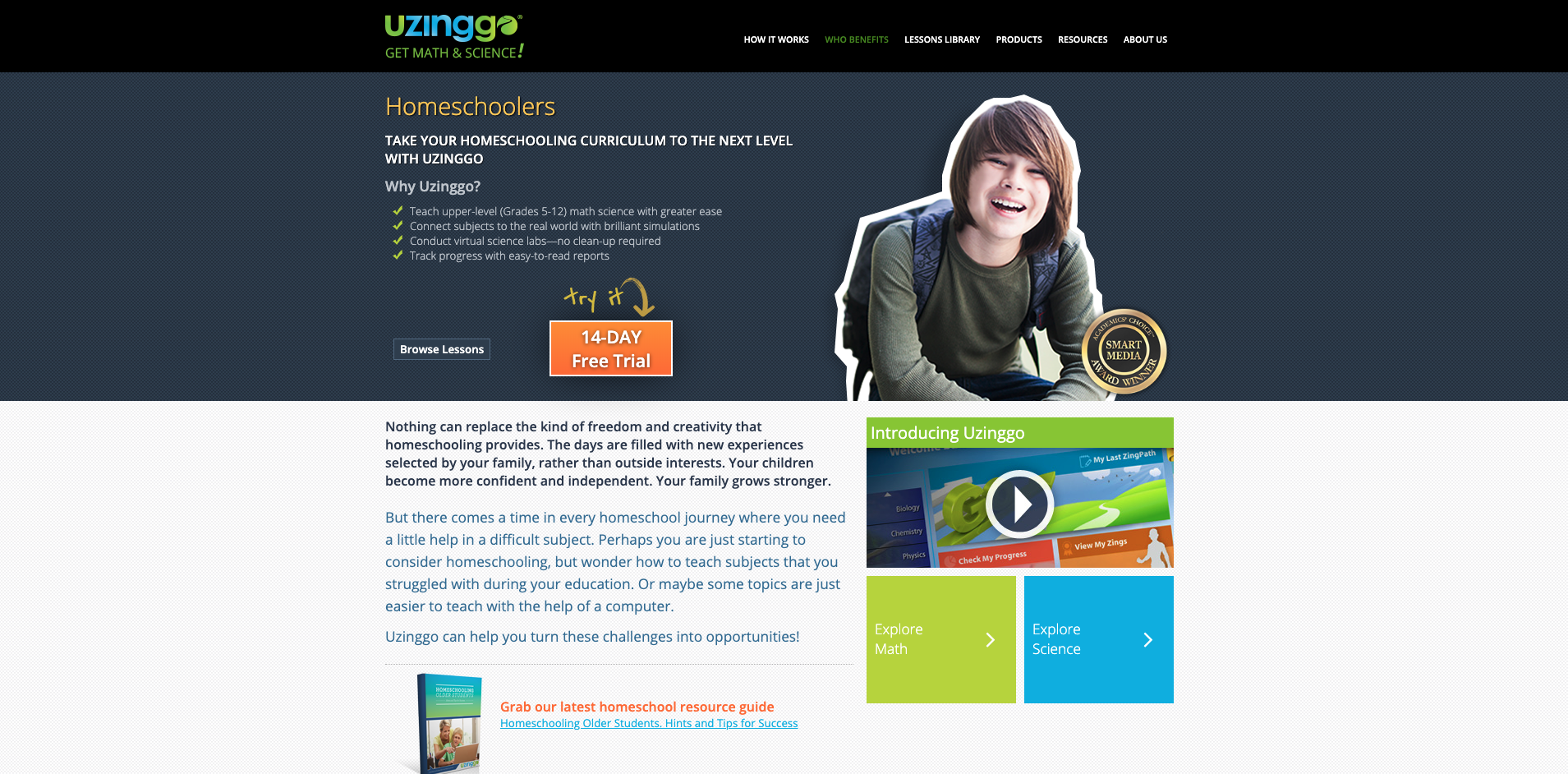
A 2013 Smart Media Award winner, UZinggo is an upper-level Math & Science learning tool developed by Adaptive Curriculum and designed specifically for middle school and high school students. They, too, allow students to approach each lesson at their own pace. They also utilize the 5E Instructional Model, which they use to:
- Engage. Aside from using real-world examples, Uzinggo has a built-in gaming platform, a competitive point system, and uses eye-catching, game-like graphics.
- Explore. Uzinggo lessons are dynamic. They encourage active learning and guided discovery. Rather than the students being handed the answers, they are inspired to experiment and discover the answers on their own.
- Explain. The explanations offered are clear, comprehensive, and reinforced with audio-visual media and text media. They can also be paused and rewound as many time as needed.
- Elaborate. Uzinggo offers extra practice and supplementary guides to make sure the students truly understand the lesson plan.
- Evaluate. Students go through quick end-of-lesson assessments to review their results and track their own progress.
At this time, UZinggo offers courses in the following subjects:
- Pre-Algebra
- Algebra 1
- Algebra 2
- Geometry
- Earth & Space Science
- Middle School Science
- Physics
- Biology
- Chemistry
For parents looking for a way to help their children understand STEM subjects at a slower, more forgiving pace, Uzinggo is a nice resource to have on hand.
JASON Learning
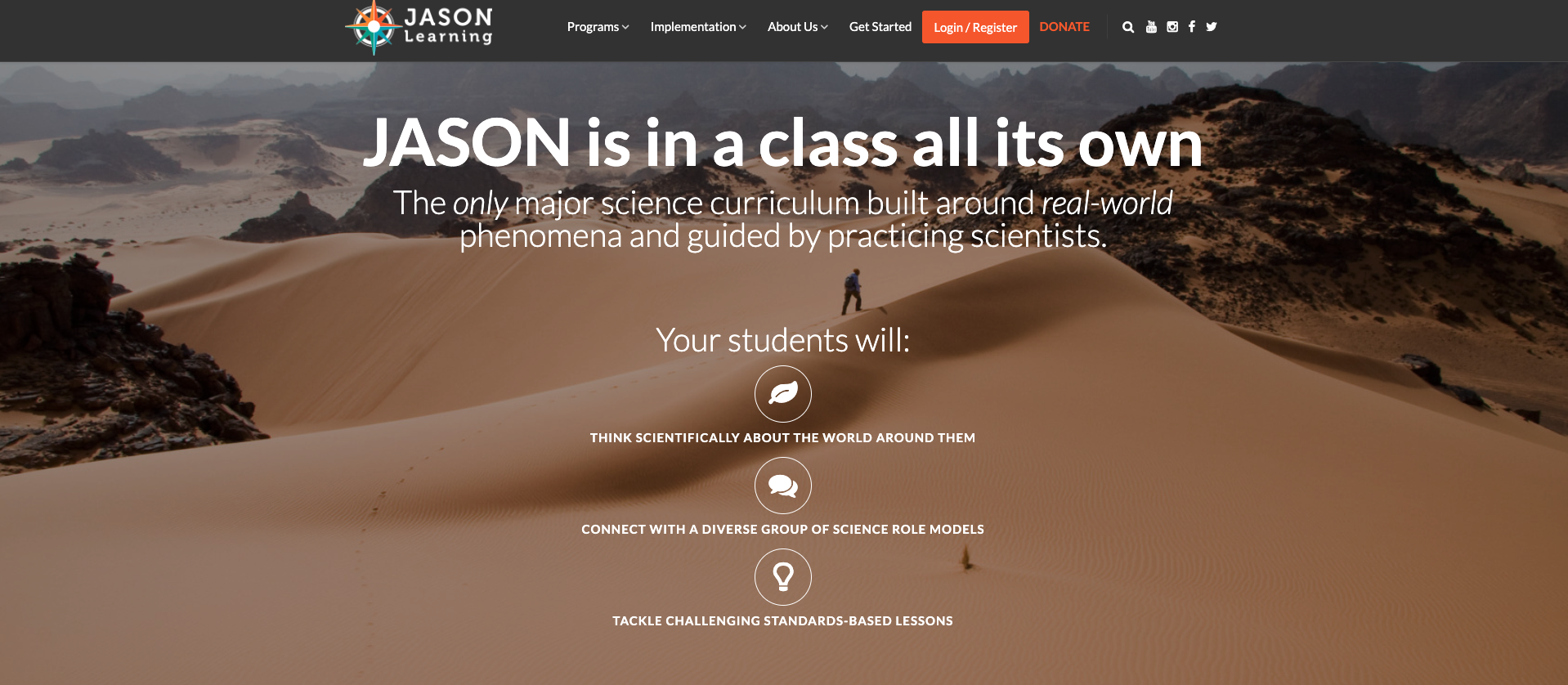
JASON Learning is a textbook-free tool that offers a multitude of online classes for parents and educators to choose from and customize for their students. Their mission is to inspire and educate students all over through STEM and exploration.
By connecting students to leading STEM professionals, JASON Learning strives to create a sense of community with STEM leadership while encouraging a love and interest in learning. They work with world-class partners to create the best possible programs. Some big names on their list include NASA, National Geographic, EarthWatch Institute, Dell, and the Smithsonian—just to name a few.
Depending on the classes and courses that the educators choose, students can participate in contests and programs that best fit their needs. They have 21 different curricula to choose from, all of which are extensive and organized:
- STEM vs. Disease
- Physical Science: World of Waves
- Wetlands: Race to Restore
- Climate: Seas of Change
- Geology: Tectonic Fury
- Forces & Motion: Terminal Velocity
- Energy: Infinite Potential
- Ecology: Resilient Planet
- Weather: Monster Storms
- Recycling: ISRI Activities Collection
- Innovation Generation
- Computer Science: Think Digital
- Immersion Learning – Stem K-6
- Engineering Workspace
- Design Thinking Challenges
- Design Thinking: Water Warriors
- ATHENA
- Biology: Living Well
- Design & Pitch Challenges in STEM
- Mathematics: JASON’s ARGO Math
- Cutting Edge
If you’re looking for a professional-yet-personalized approach to a science homeschool curriculum, JASON Learning is one of the best there is.
Experience Astronomy
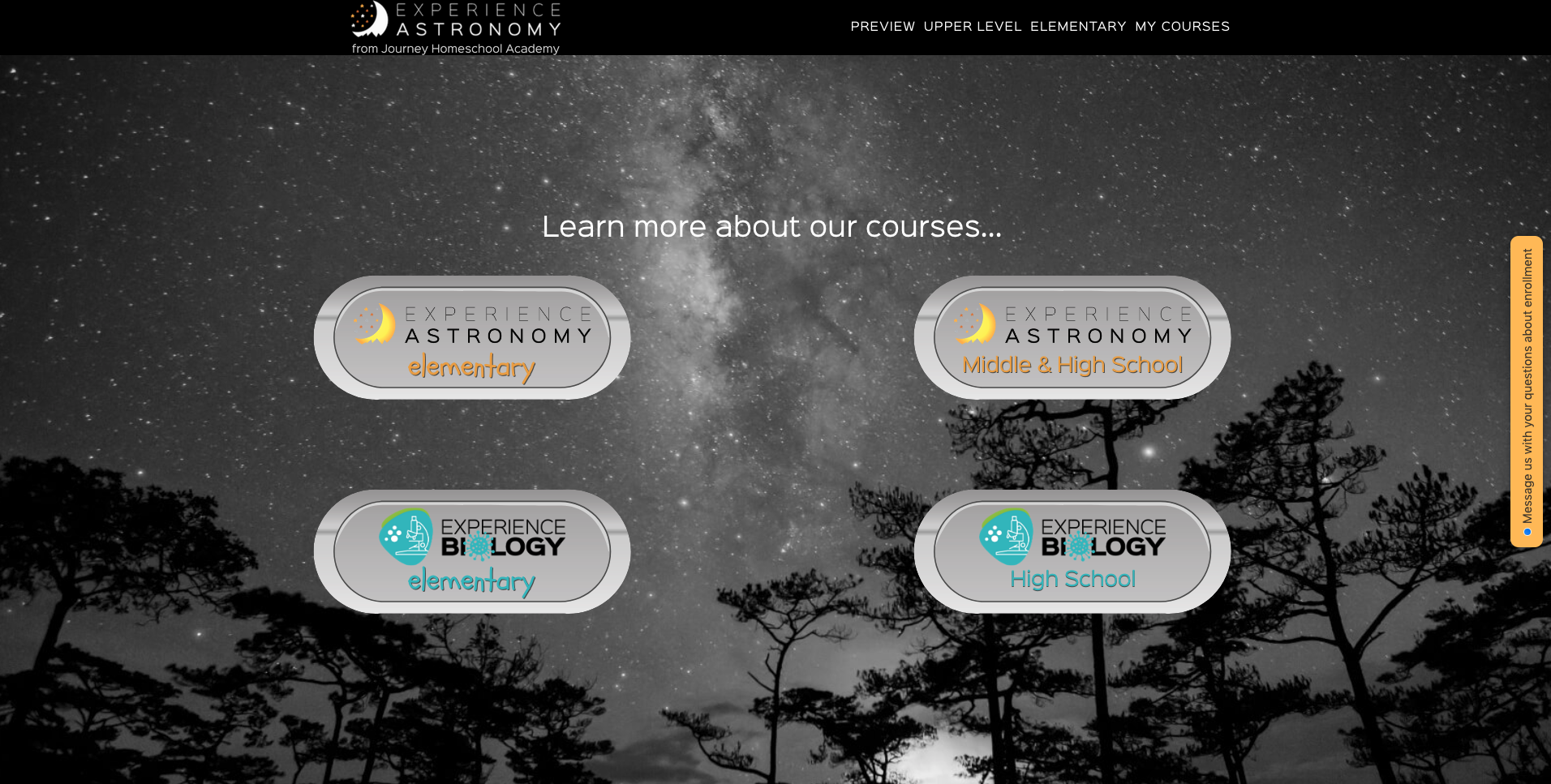
As the name suggests, Experience Astronomy is a science homeschool curriculum for families who want “high quality education plus an engaging, hands-on experience.” Designed to help students from elementary to high school level understand astronomy, it uses video lessons as the primary form of teaching and comprehension quizzes, field guide assignments, and reading assignments to measure and track progress.
Each Experience Astronomy course comes with a series of videos, activities, and books that parents can use to customize their children’s STEM curriculum. These lessons can last anywhere from 15 minutes to a couple of hours, depending on how the courses are taught.
They also offer an optional Advanced Experience Astronomy program for high school students to earn high school credit. It comes with an extra assignment book with hands-on projects, assessment exercises, and more. Plus, taking this extra credit course gives you and your child access to six (6) live online training events with the designated instructor. This is their chance to ask questions and interact with a certified professional in real-time.
Experience Astronomy believes that homeschool parents don’t need to know everything—they just need to have the best resources. And Experience Astronomy is definitely one of them.
Code.org
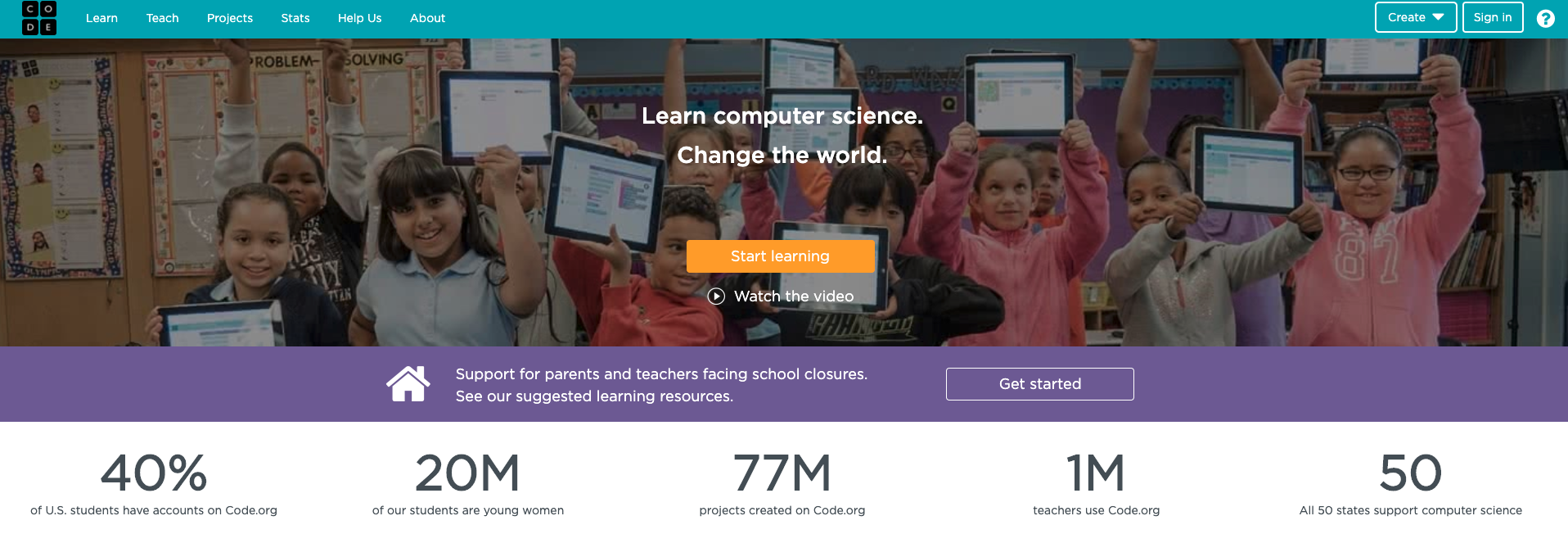
Developed by brothers Hadi and Ali Partovi, Code.org is an online homeschool computer curriculum that teaches coding for kids. As a nonprofit organization, its goal is to help students of all ages understand coding principles by giving them the opportunity to create their own games and animations via coding blocks and real-life programming languages. They offer comprehensive courses and lesson plans for teachers categorized by school level:
- Elementary—CS Fundamentals, 6 Courses
- Middle School—4 Courses, + 16 Recommended 3rd Party Courses
- High School—4 Courses, + 24 Recommended 3rd Party Courses
Code.org also strives to increase interest and participation in coding from women and underrepresented youth. Their vision is for every student in every school to have “the opportunity to learn computer science,” just as they do other subjects.
Aside from their numerous projects and game platforms, Code.org also hosts the annual Hour of Code—a worldwide event that aims to engage students in computer science and coding in the span of an hour. They’ve managed to gain the interest of more than 15% of all students around the globe.
Currently, Code.org has 20 million registered students who are young women and 1 million registered teachers. 40% of all U.S. students have an active Code.org account, and there are—to date—created 77 million projects using their platform.
Apologia Online Academy
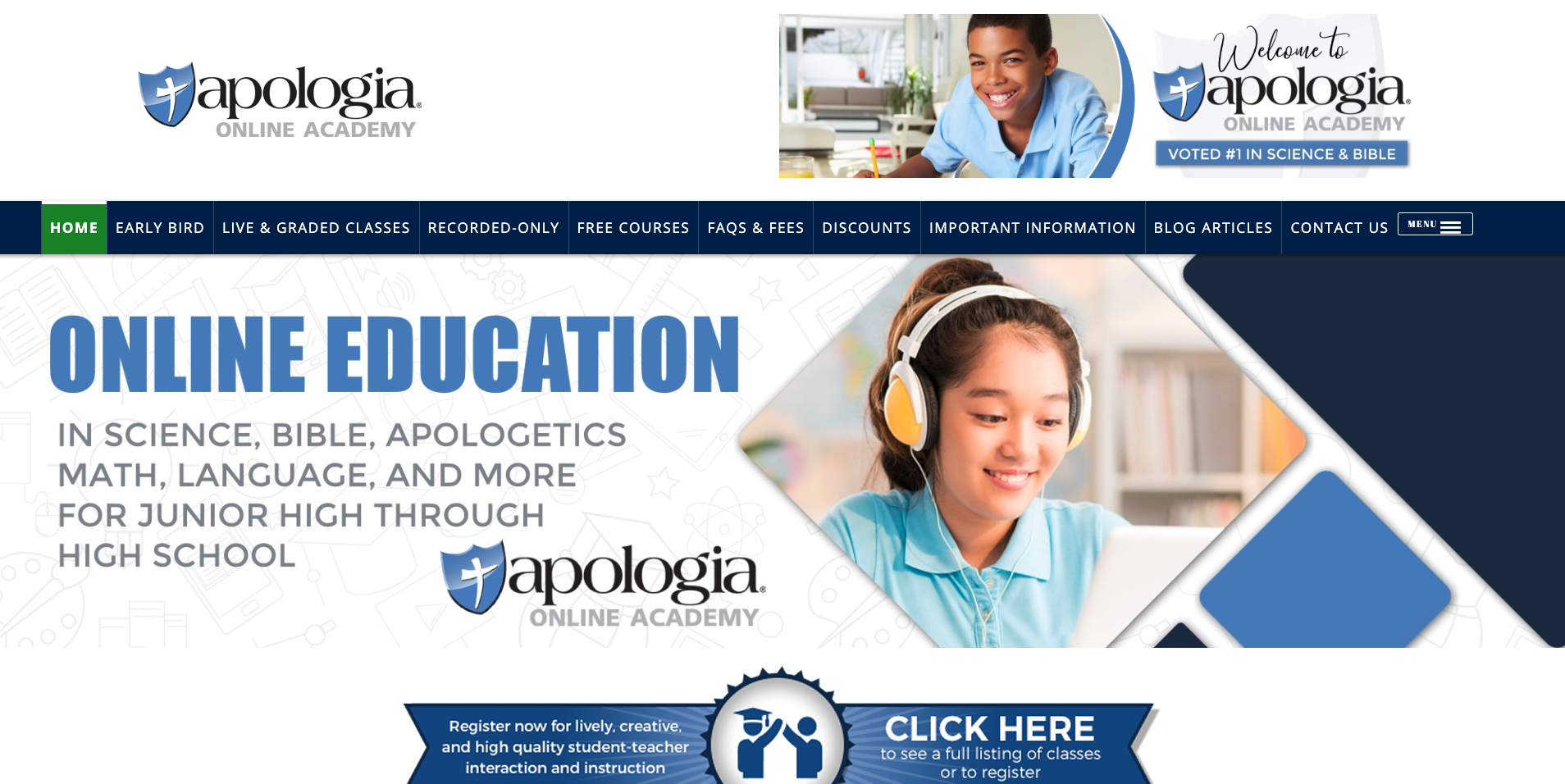
Apologia Online Academy is an award-winning, Christian-based science homeschool curriculum designed for junior high students all the way to high school. They promise high-quality educational instruction and lively, engaging student-teacher interaction. Voted #1 in STEM and Bible 12 years in a row, Apologia offers a multitude of self-paced classes, pre-recorded courses, live graded, and live non-graded courses for students to take—in other words, something for everyone.
They have four major departments: Science, Mathematics, Christian Worldview, and Language, Literature & Government. Each department covers comprehensive STEM-modeled topics, including:
- General Science
- Biology, 3rd Ed.
- Physics
- Pre-Algebra
- Algebra 1 & 2
- Pre-Calculus
- Essential Apologetics: Defending Creation
- A Survey of Competing Worldviews
- Philosophy & Ethics
- American Gov’t. Constitutional Literacy
- Economics & Personal Finance
- Latin 1 & 2
And so much more.
For parents and students interested in extensive courses covering both religion and science, Apologia is an excellent platform.
AoPS Online Programs
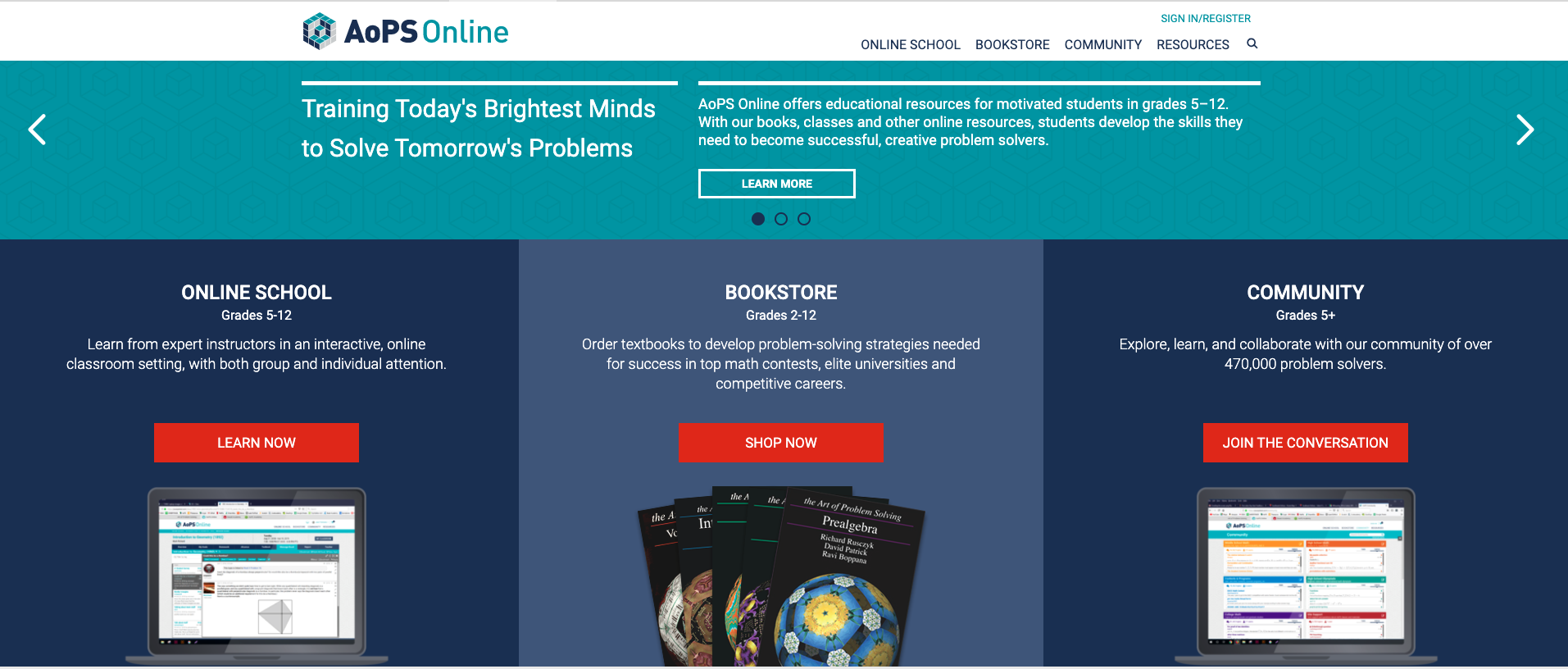
Short for the Art of Problem Solving, AoPS Online courses are accredited by the Western Association of Schools and Colleges. They are designed to help students better understand math, chemistry, physics, and computer science.
Marketed as “more than just another online class”, the AoPS curriculum aims to help students reach their full potential by connecting eager, inspired students with other like-minded learners and certified instructors. They push beyond traditional science and math by incorporating real-world concepts into challenging, intriguing problems. AoPS wants to encourage students to think outside the box by tapping into both their logic and their creativity.
Most importantly, they want to create a generation of people who love learning for the sake of it—not just to get extra credit or a passing grade.
In addition to the classes themselves, AoPS also offers free Math Jams, which are discussions of the courses themselves. They also have 7-month training programs designed to help children understand math, chemistry, and physics beyond what their core classes offer. Many of these classes are taught by award-winning teachers and MIT and Princeton alumni.
EEME
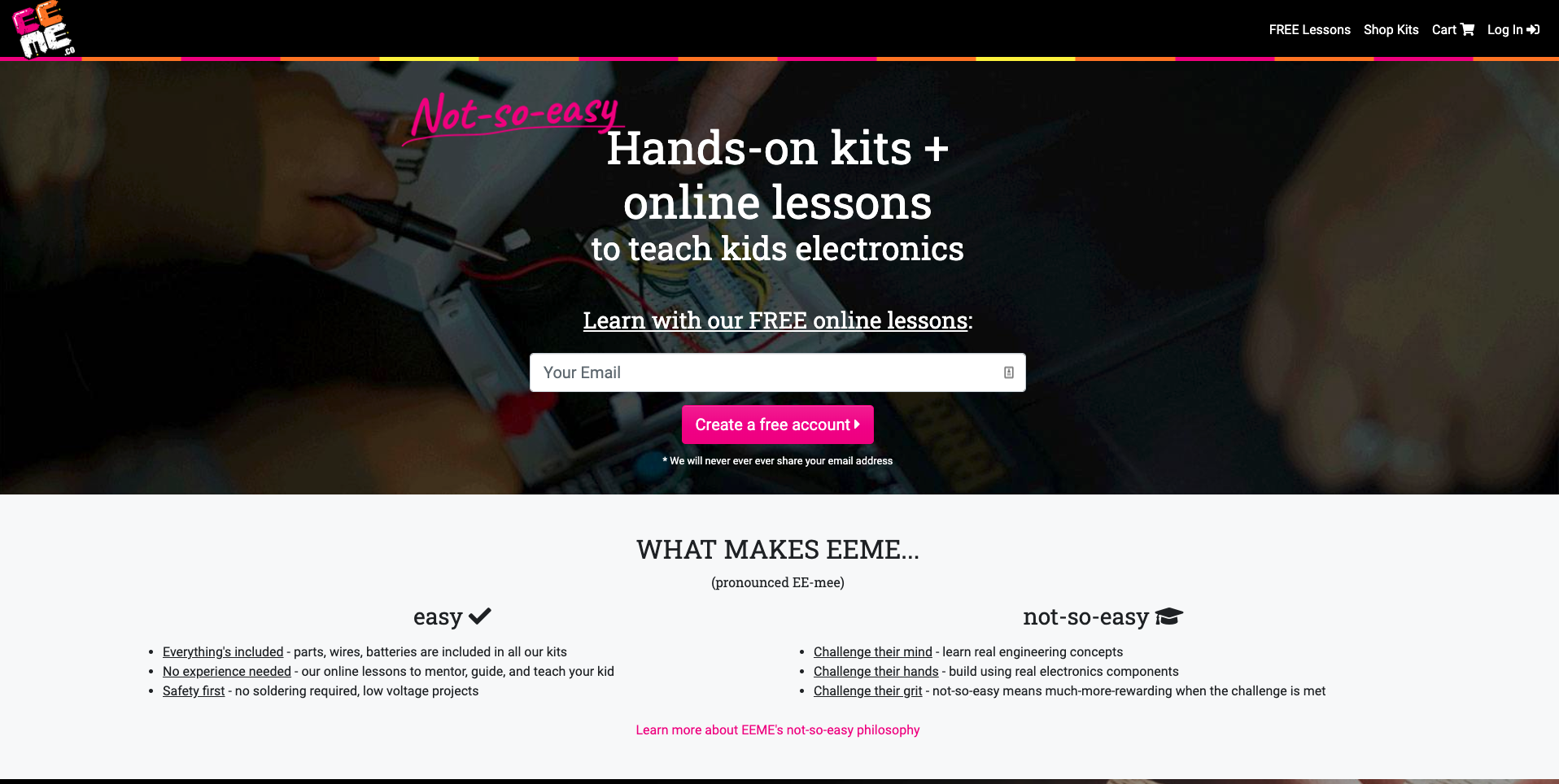
An acronym for Electronics Engineer, Mechanical Engineer, the EEME homeschool computer curriculum kit is designed to help children aged 7 to 12 understand everything there is to know about engineering. From how to design a computer the right way to figuring out how transistors work, there’s an EEME kit for it.
These hands-on learning kits are there so students can learn how to put together their own “miniature computers” using free online electronics lessons (available on the website). They pride themselves on their two-pronged “Easy, Not-So-Easy” approach that makes EEME an incredible learning platform.
- Easy — because each kit has everything. It comes with a series of electrical parts (wires, batteries, and so on) that students can put together with absolutely no experience needed. These kits prioritize safety, too, so there’s no need for soldering or high voltage.
- Not-So-Easy — because these kits are meant to challenge the students’ minds, hands, and grit. It’s to help them learn engineering concepts by building actual functional devices using real electronic components. Each kit is a challenge in its own right.
EEME believes in helping children master STEM skills and develop perseverance through their “not-so-easy” hands-on kits and online lessons.
Piper Computer Kits
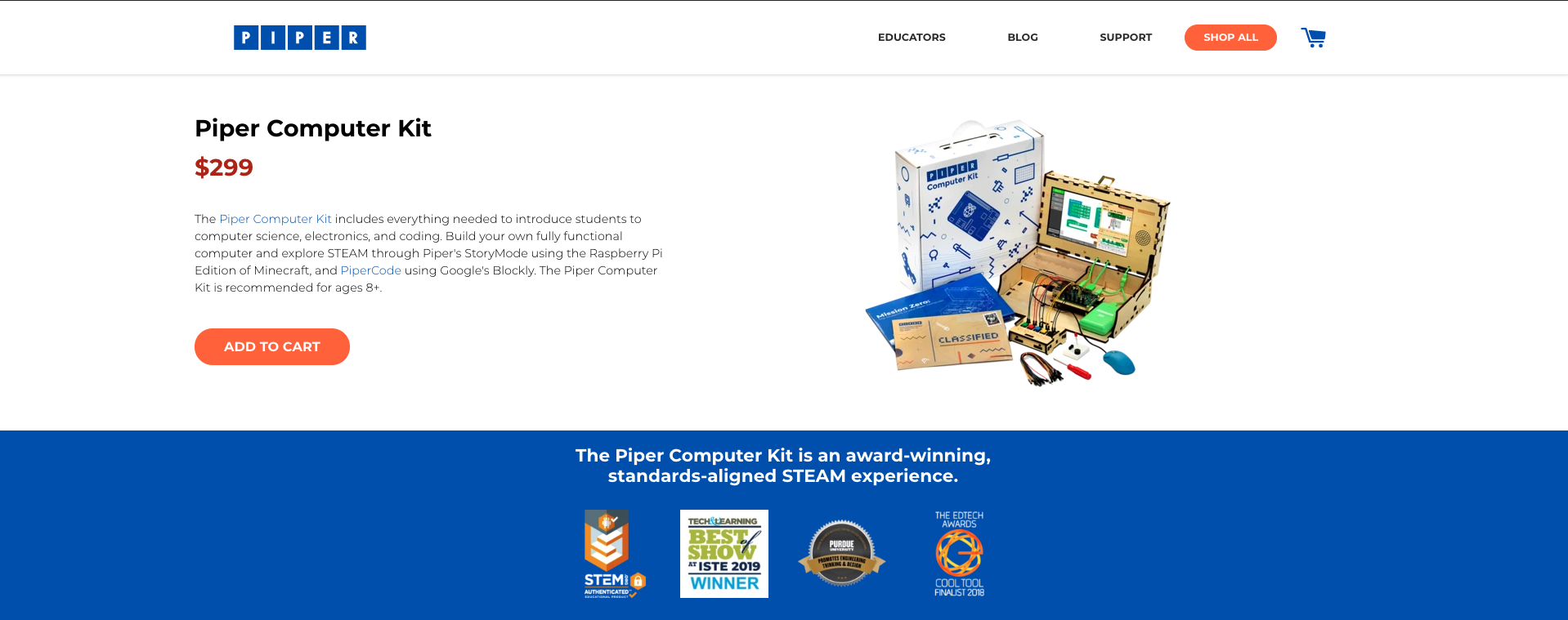
An award-winning, standards-aligned STEAM experience from Piper Inc., the Piper Computer Kit is streamlined to teach coding for kids aged 7 to 13. It does this by making them “build a computer” from scratch. This experience is then supplemented with Piper’s StoryMode—a mode that uses the Raspberry Pi edition of Minecraft—and PiperCode using Google’s Blockly.
In line with Piper’s mission to encourage tinkering and hands-on learning, each Piper Computer Kit comes with a series of parts such as wires and breadboards for children to put together. All of the games utilize an easy-to-learn curriculum for kids taught by Stanford University. This way, even parents with very little computing background can teach their children how to code—among other skills.
The kits themselves encourage DIY learning, visual problem solving, and inspired exploration. For students interested in learning computer science on-the-go, they’re great to have on-hand. Piper Computer Kits perfectly combine offline activities with online interaction to create a one-of-a-kind learning experience.
Tynker
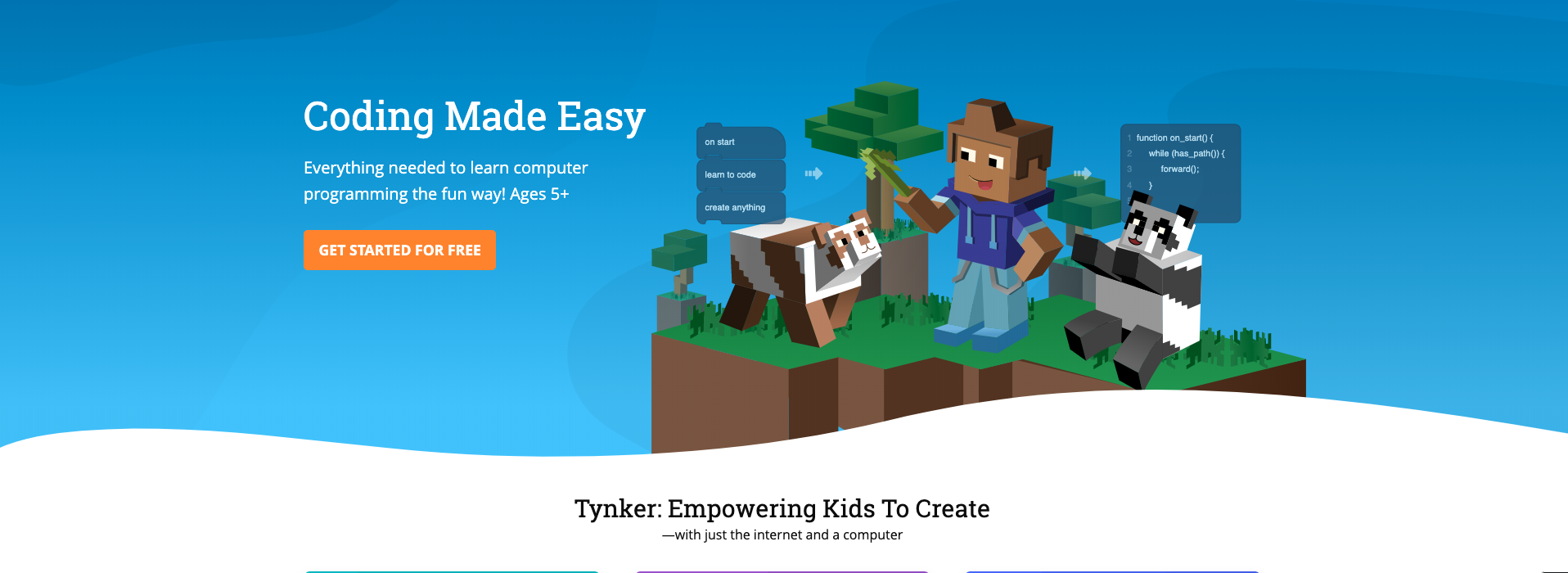
Similar to Code.org, Tynker is a fun, educational resource that allows children ages 5 and up to create their own video games and animations using popular franchises like Minecraft and Barbie.
All of the lessons utilize the self-taught approach. They range from “Intro to Coding,” where students learn basic coding principles such as conditionals and sequences by putting together coding blocks, to “Advanced Languages,” which teaches coding for kids using real-life programming languages. Through Tynker, children can learn how to build their own virtual creations at their own pace, all the while engaging themselves with their favorite characters.
What’s more, Tynker has something for Educators and Parents, too. For educators, they’ve designed a fun coding curriculum suitable for K-12. For parents, you get to choose what your kid learns and how they learn it from over 3,700 unique modules. Get them Coding with Barbie or send them on a Goblin Quest!
Overall, Tynker is a great tool for parents who want their kids to learn to code, and feel they’d benefit more from a self-taught learning experience guided by beloved characters.
Fascinating Education

Fascinating Education is an online course that promises students that it’s the “easy way” to learn science. Created by retired neurologist Dr. Sheldon Margulies, it’s a science homeschool curriculum that is specifically designed to encourage middle and high school students with minimal or no prior scientific knowledge to, “approach science through the “right hemisphere” of the brain.”
Simply put, he offers a more creative, fascination-based approach to teaching Chemistry, Biology, Physics, Medicine, and more.
Each subject comes with a series of 20 lessons (or less) that parents can adjust according to their child’s needs. These lessons have a quiz at the very end of every lesson, as well as a series of lab assignments that students can complete on or offline.
As of now, this site offers the following subjects:
- Physics
- Biology
- Chemistry
- Medicine
- Anatomy
For parents looking for a “no-textbook” approach for their kids, Fascinating Education is a decent platform with lots of potentials.
In Conclusion
We believe that the following science homeschool curriculum will give you some excellent options for your kids/students:
- CodaKid – Great for parents who want to teach their children real-life computer science skills
- Timberdoodle Kits – Great for parents who want to teach their children STEM beyond using online courses
- Science4Us – Great for parents who want to teach their students STEM from an elementary liberal arts background
- Fascinating Education – Great for parents who want to teach their middle and /or high school students biology, chemistry, physics, anatomy, and/or medicine in a fun, engaging way at their own pace
- littleBits– Great for parents who are looking for Arduino boards and accessible circuitry kits to introduce the fundamentals of electrical engineering.
- Scratch 3.0 – The original visual block coding program for kids with a new design and mobile capabilities.
- UZinggo – Great for parents who want middle and high school students to learn about Math and Science at their own pace
- JASON Learning – Great for parents who enjoy customizing their children’s STEM education and tracking it however they want
- e-Science – Great for parents looking for a hands-on STEM curriculum taught by a former NASA scientist
- Experience Astronomy – Great for parents looking to teach their children astronomy anytime, anywhere of the day
- Code.org – Great for parents looking to get their children more involved in learning how to code
- Apologia Online Academy – Great for parents who want to teach their middle and high school children STEM subjects from a Christian-based perspective
- AoPS Online – Great for parents who want to get their middle and/or high-schoolers more involved with math-based learning
- EEME – Great for parents who want to give their children a fun and engaging introduction to engineering
- Teach Engineering – Great for parents who want to give students grades K-12 a steady foundation on STEM subjects and theories
- Piper Computer Kits – Great for parents who want to teach their children how to build their own hardware as young as 7 years old
- Tynker – Great for parents who want to teach their children how to code using their favorite franchise characters
In the meantime, would you mind letting us know which STEM curricula you’re thinking of giving a try this year? If we missed something really good, we’d love to add it in a future update!
As always be sure to check out our free trial for CodaKid today!




